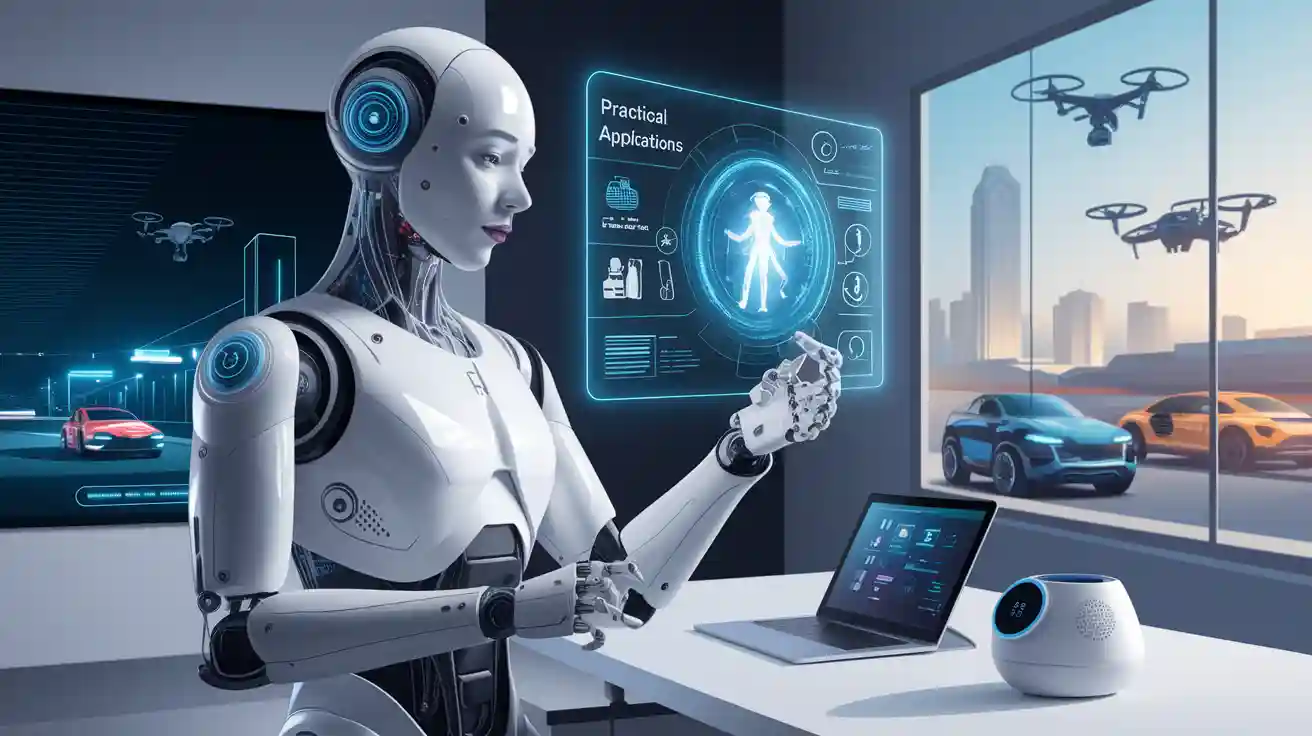
Artificial general intelligence is reshaping industries in ways you never imagined. AI now enables early disease detection by analyzing medical images faster than radiologists. Intelligent tutoring systems adapt to your learning pace, offering personalized education. AI-driven wearables monitor health metrics in real time, empowering proactive care. These examples showcase AGI’s growing influence in 2025.
Key Takeaways
-
AGI helps doctors find illnesses faster and more accurately. It also creates personal treatment plans, making patients healthier.
-
In schools, AGI makes learning fit each student’s needs. It gives helpful feedback and adjusts tests to improve learning.
-
AGI improves businesses by making customer service better and speeding up product creation. This makes customers happier and work smoother.
Real-World Examples of AGI in Healthcare

Diagnostics and Personalized Medicine
Artificial general intelligence is revolutionizing healthcare diagnostics and personalized medicine. You can now benefit from faster and more accurate diagnoses, thanks to AGI's ability to analyze complex medical data. For example, IBM Watson Health has achieved a 15% increase in cancer diagnosis accuracy by assisting oncologists in interpreting genomic information and medical journals. It also reduced the time needed to develop personalized cancer treatment plans from weeks to days, enabling quicker interventions.
AGI-powered systems like PathAI have improved diagnostic accuracy by 25%, particularly in challenging cases such as cancer subtypes. These systems also cut analysis and reporting times by 50%, allowing healthcare providers to make faster treatment decisions. Additionally, PathAI has reduced misdiagnoses by 20%, minimizing the risk of false negatives and positives.
AGI's capabilities extend beyond diagnostics. It customizes treatment plans based on individual medical histories and genetic information, ensuring you receive care tailored to your unique needs. This level of personalization enhances patient outcomes and reduces medication errors. IBM Watson Health, for instance, flagged potential drug interactions and allergies in patient records, leading to a 30% reduction in medication errors.
Here’s a snapshot of AGI’s contributions to diagnostics and personalized medicine:
|
Organization |
Improvement Metric |
Outcome Description |
|---|---|---|
|
IBM Watson Health |
15% increase in cancer diagnosis accuracy |
Assisted oncologists in analyzing complex medical data, including genomic information and medical journals. |
|
IBM Watson Health |
Reduction in treatment plan development time |
Helped reduce the average time to develop a personalized cancer treatment plan from weeks to days. |
|
IBM Watson Health |
30% reduction in medication errors |
Flagged potential drug interactions and allergies in patient records. |
|
PathAI |
25% improvement in diagnostic accuracy |
Compared to traditional evaluations, especially in challenging cases like cancer subtypes. |
|
PathAI |
50% reduction in analysis and reporting time |
Enabled quicker treatment decisions for patients by reducing the time taken to analyze pathology reports. |
|
PathAI |
20% reduction in misdiagnoses |
Decreased the rate of false negatives and false positives in pathology reports. |
Treatment Planning and Predictive Analytics
AGI is transforming treatment planning through predictive analytics. You can rely on AGI to identify patients at risk for chronic diseases or hospital readmissions, improving outcomes and reducing costs. Predictive models analyze historical and current data to guide health initiatives and target interventions effectively.
For instance, AGI systems like Quris AI and Insilico Medicine are leading innovations in treatment planning. Quris AI’s “Patient-on-a-Chip” technology is revolutionizing drug testing, while Insilico Medicine uses AGI to design new drugs. These advancements accelerate medical research and ensure safer, more effective treatments.
AGI also enhances clinical workflows. Ambient listening technologies streamline documentation, alleviating clinician burnout. Revenue optimization tools improve financial efficiency, allowing healthcare providers to focus on patient care.
Here’s a summary of AGI’s applications in treatment planning:
-
Predictive analytics identifies patients at risk for chronic diseases and hospital readmissions.
-
AGI systems customize treatment plans based on individual medical histories and genetic information.
-
Companies like Quris AI and Insilico Medicine are driving innovations in drug testing and development.
-
Ambient listening technologies and revenue optimization tools enhance clinical workflows and reduce clinician burnout.
The integration of AGI in healthcare is a force multiplier, combining intelligence with complementary technologies to deliver better outcomes for patients and providers alike.
Use Cases of AGI in Education and Business
Personalized Learning Experiences
Artificial general intelligence is transforming education by creating customized learning paths for students. You can now experience lessons tailored to your unique needs, thanks to AGI's ability to analyze real-time data and adapt content dynamically. For example, intelligent tutoring systems provide immediate feedback and adjust the difficulty of practice problems based on your performance. This ensures you receive challenges that match your skill level, helping you grow without feeling overwhelmed.
AGI-powered platforms like Carnegie Learning and Squirrel AI have demonstrated remarkable results. Carnegie Learning's AI-driven math software offers personalized feedback, enabling students to score an average of 63% higher on tests compared to those who use traditional methods. Similarly, Squirrel AI creates customized learning plans, leading to a 15% improvement in test scores for its users.
Adaptive assessments are another breakthrough. These tools adjust question difficulty based on your responses, providing a more accurate measurement of your knowledge. This approach not only enhances your learning experience but also helps educators identify areas where you need additional support.
Here’s a table summarizing AGI's contributions to personalized learning:
|
Application |
Description |
Outcome |
|---|---|---|
|
Personalized Learning |
AGI analyzes student data to tailor educational content to individual needs. |
Students improve in areas identified as needing more practice. |
|
Intelligent Tutoring |
Provides immediate feedback and adjusts difficulty based on performance. |
Students receive practice problems that gradually increase in difficulty. |
|
Adaptive Assessments |
Adjusts question difficulty based on student performance. |
More accurate measurement of knowledge compared to traditional assessments. |
|
Carnegie Learning |
AI-driven math software providing personalized feedback. |
Students scored an average of 63% higher on tests compared to those who did not use it. |
|
Squirrel AI |
AI tutoring platform creating customized learning plans. |
Users scored an average of 15% higher on tests than non-users. |
|
IBM Watson |
Analyzes student interactions for personalized feedback. |
Students scored an average of 60% higher on tests than those who did not use the system. |
|
Duolingo |
Language app personalizing learning experiences based on user data. |
Users achieve proficiency equivalent to a semester-long college course after 34 hours. |
Tip: AGI's ability to adapt to individual needs empowers you to take control of your learning journey. It identifies gaps in your understanding and provides targeted interventions, ensuring you achieve your full potential.
Enhancing Customer Service and Innovation
Artificial general intelligence is revolutionizing business by enhancing customer service and driving innovation. You can now enjoy personalized customer experiences, thanks to AGI's ability to analyze data and predict your preferences. For instance, an online specialty food store implemented AI to offer tailored product recommendations, improving customer satisfaction and boosting sales.
AGI-powered chatbots are another game-changer. A family-run hotel used an AI chatbot to handle basic inquiries, freeing up staff to focus on guest satisfaction. These chatbots provide instant responses, ensuring your questions are answered promptly and accurately.
Businesses also leverage AGI to innovate faster. Companies use AGI to analyze market trends and develop new products. This accelerates the innovation process, allowing businesses to stay ahead of competitors. AGI's capabilities extend to optimizing operations, such as quality assurance and compliance monitoring. By automating these processes, AGI reduces manual effort and enhances efficiency.
Here’s a table highlighting AGI's impact on customer service and innovation:
|
Metric Type |
Description |
|---|---|
|
Measures service quality and customer loyalty, indicating the effectiveness of AI in resolving inquiries. |
|
|
Net Promoter Score (NPS) |
Reflects customer loyalty and satisfaction, crucial for assessing AI's impact on customer relationships. |
|
First-call resolution rate |
Indicates how effectively AI resolves customer inquiries on the first contact, impacting CSAT. |
|
Customer retention rates |
Shows the effectiveness of AI-driven personalization in maintaining customer relationships. |
|
Churn rates |
Measures the rate at which customers stop doing business, influenced by AI support and personalization. |
|
New products/features launched |
Indicates how AI accelerates product development and innovation. |
|
Cross-sell/up-sell rates |
Measures the effectiveness of AI recommendations in driving additional purchases. |
|
Market share gains |
Reflects the impact of AI on capturing market opportunities and revenue growth. |
Note: AGI's decision-making abilities enable businesses to make data-driven choices, improving customer satisfaction and fostering innovation.
AGI's applications in education and business demonstrate its core traits: adaptability, intelligence, and efficiency. Whether you're a student seeking personalized learning or a customer enjoying tailored experiences, AGI is reshaping the way you interact with technology.
Applications of Artificial General Intelligence in Sustainability and Governance

Tackling Environmental Challenges
AGI is playing a pivotal role in addressing environmental challenges. You can see its impact in areas like energy efficiency, waste reduction, and emissions monitoring. Real-time analytics powered by AGI help identify energy usage patterns and efficiency gaps. This allows industries to optimize their operations and reduce unnecessary energy consumption. For example, AGI systems monitor emissions and provide actionable insights to minimize environmental impact.
In manufacturing, AGI-driven business intelligence tools optimize material flows, promoting circularity and reducing waste. These tools enable companies to implement targeted sustainability initiatives, such as recycling programs or energy-efficient production methods. By leveraging AGI's capabilities, you can contribute to a greener future while maintaining operational efficiency.
Environmental performance data also highlights AGI's effectiveness. For instance, AGI systems assess electricity usage, carbon footprints, and water consumption. These assessments guide organizations in adopting sustainable practices. Whether it's calculating emissions or evaluating water usage through Water Usage Effectiveness (WUE), AGI ensures precise and actionable insights.
Improving Public Services and Decision-Making
AGI is transforming governance by enhancing public services and streamlining decision-making. Estonia provides one of the best examples of how AGI improves government efficiency. AI agents in Estonia automate processes like birth registration, healthcare enrollment, and fraud detection. This reduces bureaucratic overhead and improves response times, ensuring you receive faster and more reliable services.
AI-driven systems also enhance decision-making abilities in governance. By analyzing vast amounts of data, AGI helps governments identify trends and allocate resources effectively. For example, Estonia's digital government infrastructure uses AGI to engage citizens and improve service delivery. This approach not only saves time but also fosters trust between governments and their citizens.
AGI's autonomy in handling complex tasks allows governments to focus on strategic initiatives. Whether it's risk assessment or resource allocation, AGI ensures data-driven decisions that benefit society. Its applications in governance demonstrate how general AI could change everything, from public service delivery to policy-making.
Artificial general intelligence is transforming industries and improving lives. In healthcare, it enables personalized treatments and predictive care. Education benefits from hyper-personalized learning, while businesses innovate faster with AI-driven insights. Sustainability efforts gain momentum through optimized resource use and emissions monitoring.
AGI holds immense potential to address global challenges:
-
Accelerating scientific discoveries, such as disease cures.
-
Shaping new industries and redefining work.
-
Enhancing global access to quality education.
-
Tackling environmental issues with innovative technologies.
However, challenges persist. Ethical concerns include safety and moral responsibility. Regulatory frameworks must evolve to address risks like AI consciousness and misuse.
Looking ahead, AGI will continue to reshape industries and society. Its intelligence will drive innovation, improve quality of life, and help solve humanity’s most pressing problems.
|
Aspect |
Description |
|---|---|
|
Transformative Potential |
AGI drives efficiency and innovation, requiring updated skills and ethics. |
|
Ethical Challenges |
Safety, responsibility, and moral concerns remain critical issues. |
|
Regulatory Challenges |
Current laws may not address AGI's risks, necessitating new guidelines. |
|
AI Consciousness |
Raises questions about welfare policies and ethical considerations. |
|
Human Factors |
Collaboration ensures safe and ethical AGI design. |
FAQ
What makes AGI different from traditional AI?
AGI can perform a wide range of intellectual tasks, adapting to new challenges without specific programming. Traditional AI focuses on narrow, predefined tasks.
How does AGI ensure autonomy in decision-making?
AGI uses advanced algorithms to analyze data and make decisions independently. This autonomy allows it to handle complex tasks without constant human intervention.
Is AGI safe to use in critical industries?
Yes, AGI undergoes rigorous testing to ensure reliability. Developers prioritize safety protocols to minimize risks in healthcare, governance, and other critical sectors.








